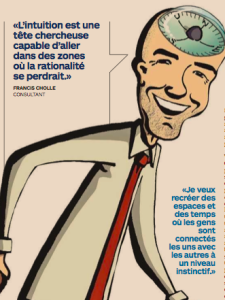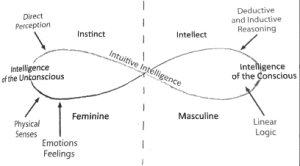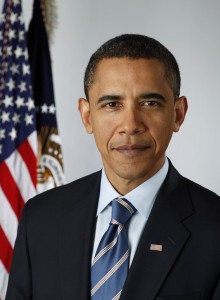 The following article about the work we do at The Human Company was published on the January 9, 2016 in the magazine L’Echo.
The following article about the work we do at The Human Company was published on the January 9, 2016 in the magazine L’Echo.
“Disruption.” Such is the word that describes the powerful upheaval of the rules of the economic game, due to globalization and digital technologies. When the methods of the past don’t work anymore for the problems of the present, finding new keys to success becomes essential. Consultant Francis Cholle is working on just that.
By Stéphanie Fontenoy
French-American Francis Cholle, business consultant and founder of the consulting firm, The Human Company, presents us with his Intuitive Compass®, a true compass for innovation in the hands of business leaders to better navigate in this capricious economic weather. As in Edgar Allen Poe’s A Descent Into the Maelstrom, the one who will be saved is the one who will know how to use their intuitive intelligence in the face of the storm. How? By anchoring instinct to reason, so that “a non-rational logic” emerges, holding within new forms of conflict resolution and understanding of complexity. “Intuition is a homing instinct able to forage in areas where rationality would get lost,” explains the expert. His Intuitive Compass® is comprised of two axes: the North-South axis, which connects reason to instinct, and the East-West axis, the results and “play”. Through a quiz, each company can discover its position thanks to this “compass” and find new roads to explore. To create this model, Francis Cholle, a graduate from HEC, not only drew from his experience as an entrepreneur and business owner, but also from clinical psychology, the teaching of yoga and meditation, and operatic singing, fields that he practiced professionally, as well as many other areas of study and scientific research. His workshops or “Labs” have been taken on by several Fortune 500 companies, including L’Oréal, Estée Lauder, SAP-Business Objects, Bristol Myers Squibb, Hachette, Lagardère, Veolia and Ralph Lauren. He is the author of the bestseller L’Intelligence Intuitive (“To succeed in a different way”) and in English, of a book for leaders, The Intuitive Compass (Why the Best Decisions Balance Reason and Instinct).
You introduce the concept of play and techniques borrowed from the theater in your business workshops. Why?
Because the problems we need to solve today require solutions that we can’t access with traditional thinking strategies. It has been proven neurologically that play allows us to call upon layers of the brain where forms of intelligence only accessible through play, meditation, psychotropic drugs or dream reside. When we play, we are less in “self-control”, we are more open, more creative, and able to take more risks.
In what way is intuitive intelligence particularly important nowadays?
Because we have to realize that this “disruption” phenomenon that we are faced with now is not simply a passing phase to get through, but a new norm, a “new normal” that requires a fresh look at the world. We rediscover that change is really the only thing that never changes, whereas so far, we had a much more static vision of the world.
The models taught in business schools do not fit this new reality?
Things are changing everywhere, including in business schools. Nevertheless, I think students should get help rethinking their relationship with complexity: admit, on the one hand, that resolving complexity is a field where linear, logical and strategic ways of thinking are not adapted to the demands of “disruption”, and on the other hand, that the human race has never ceased to solve complex situations through hundreds and thousands of years, long before the rise of modern logic. It’s an innate aptitude of man that transcends culture and training, that we have access to at any given time. It’s this universal competence that I help leaders achieve in their companies, in a practical and concrete fashion, at the heart of new methods of management, change organization and realization, new approaches to their markets, their know-how and creation of value. It is what the next generation has to discover and learn to mobilize, in business and elsewhere.
Einstein said, “The intuitive mind is a sacred gift and the rational mind is a faithful servant.” You mention a Nobel Prize in Chemistry, Kary Mullis, who explains that his greatest discovery was made while he was driving, with an idle mind, far from his laboratory and research work. What does that tell us about intuition?
The IBM Global CEO study of 2010 revealed that close to two thirds of the leaders of small and large businesses, in 60 countries and 33 sectors, considered that creativity would become their most important skill during the next five years. In his latest book, Eric Schmidt, head of Google, explains that to face “disruption”, one has to rely more on good creative people than strategists. Other studies have showed that a large part of this creativity resides in our subconscious. We access it while we sleep, of course, but also through play or when our mind escapes the conscious straightjacket of rational thinking. I really like these words by a foundational scientist of quantum physics, Niels Bohr, “No, no, you are not thinking, you are only being logical!” It summarizes well the concept that thought is not limited to what we traditionally call logic, in science. Playing, like any other activity that allows us to disconnect from conscious logical thinking, therefore opens the door to creative intuition. The advantage of play is that it is an active mode that can easily be integrated inside work and collaboration processes. American medical researchers from the University of Washington used it a few years ago. In just three weeks, they obtained results they hadn’t been able to reach in ten years of research, by inviting non-scientist gamers to take part in an interactive game, Fold It.
During your Labs, you ask participants to remove their shoes. For what reason?
Shoes, just like ties or vests, are part of the prerogative of the professional “persona”, the character we build at work. By removing these accessories that contribute to the “persona”, we allow without any particular effort for the people present to be naturally more authentic, so they live less inside their heads and more inside their bodies, so they access what they feel more and their intellect less, and therefore access original creative information.
Describe to us the play session you use to create this realization that another form of deeper and more creative intelligence lies dormant inside us.
The group must recreate the alphabet, from A to Z, with closed eyes, one letter at a time, following alphabetical order, but according to a random order of participation of each member in the group. The group is not allowed to agree on a specific strategy prior or during the exercise. Participants are only allowed to speak to say a letter. No one knows who will speak or when. If two people say a letter at the same time or if the alphabetical order is not respected, we start over from the beginning. I face the group with a complex situation for which there is no preconceived solution. The logical mind is powerless when it comes to solving this situation, naturally complex. Nonetheless, the logical mind is called upon to respect the alphabetical order. However, the group always ends up succeeding. This demonstrates to leading executives that there is another way to solve problems than that of logical and strategic thinking. Participants need to keep their rational intelligence active, but also let another way of thinking emerge, that of non-rational logic.
What is the goal?
I want to recreate spaces and times where people function connected to each other on a very instinctive, universal, efficient level because it is beyond opinions, emotions and all expressions of separation. It’s a place that can give rise to a unanimity that could not be reached in another manner, and certainly not that fast, because we can always debate things forever. Culturally, we are very concerned with debating ideas. The goal is to reach a quality of relating to oneself and others that goes beyond the limits of the mental, rational and conscious mind, to accomplish a universal convergence that will open a previously unseen range of possibilities and reinvention. It’s a cathartic experience for each participant. Once this experience has been shared by the group, the executive committee for example, there emerges a sense of the possible and consensus. The quality of the interaction between the members of the group becomes completely different. New solutions appear and concrete actions can be decided upon. The next step is building precise and detailed action plans and allowing each participant to make these new solutions their own and become engaged in implementing them. Finally, the ultimate step is to establish these new practices in the daily life of the group and its participants. This requires support through time to fight individual and organizational inertias. Yet we manage, with time and particular care, to develop this new approach in a durable manner, and impress it on minds, work processes and thought patterns.
Your methodology is used by companies like L’Oréal, Lagardère, Estée Lauder Companies. Concretely, how does it work?
I worked recently with a subsidiary of a French multinational company in Japan, in the beauty industry. This group historically had difficulties breaking into the Japanese market. One of the problems is the adaptation of the company’s development model to the particularities of Japan, as much inside as outside the company. For example, the Japanese don’t deal with problems the way Westerners do. Their approach is contextual. The western way of thinking tends to face a problem straight on, like an arrow on a trajectory to its targeted objective, while Japanese people move forward progressively and according to a “hidden order” for the western mind. This is how they solve problems and lead projects. The alphabet game allowed the company’s executive committee to go beyond this very limiting cultural gap. It allowed the Japanese members of the executive committee to feel understood and the Westerners to better grasp the expectations of the Japanese. They managed to better work together and better overcome their challenges without having to understand all the nuances and differences of their respective managerial cultures. They’ve integrated the exercise and repeat it each time the committee meets, as if to find the same wavelength beyond their cultural differences. Once a group has perceived the depth and power of this process, they implement and use it. This allows them to immediately work better together and efficiently, rapidly, solve complex challenges born from the “disruption” they must face. The stakes and the speed of change are such that we have to learn new swift attitudes and new creative ways of thinking at the same time as we solve pressing issues.
Have you had results backed up by figures?
Yes, always. Our approach is built for that purpose. Most of my clients – companies with several billions in revenue and thousands of employees – like many companies today, are confronted with outdated business models, because of the global competition and digital newcomers, to the extent that some of them are experiencing losses. The reinvention of their business model was absolutely necessary. I’m thinking among others of Hachette Media (press) in the United States or Lagardère Unlimited (sports marketing) in Europe and Africa. In record time – less than a year – our approach allowed them to identify and implement the changes necessary, to get back on track with a viable business model, to regain considerable market shares and to reach a good level of profitability, in spite of a constantly changing competitive environment. “Disruption” doesn’t frighten them anymore. They are now equipped to face it.


 Francis and The Human Company are co-authoring this movement and a book along with Deborah Burns, president of DLB Ventures and former client of ours, to help women recognize and validate feminine values that are the key to success in the 21st century, including receptivity, creativity, empathy, openness, and inclusivity.
Francis and The Human Company are co-authoring this movement and a book along with Deborah Burns, president of DLB Ventures and former client of ours, to help women recognize and validate feminine values that are the key to success in the 21st century, including receptivity, creativity, empathy, openness, and inclusivity. The following article about the work we do at The Human Company was published on the January 9, 2016 in the magazine L’Echo.
The following article about the work we do at The Human Company was published on the January 9, 2016 in the magazine L’Echo.


